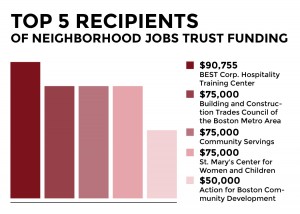
Boston’s Office of Jobs and Community Services awarded a grant of more than $1 million to 19 community-based career development community organizations, the Boston Redevelopment Authority announced Friday.
Boston Mayor Martin Walsh said the office’s goal is to best prepare Boston residents to excel in the city’s diverse workforce.
“We must provide residents with the resources they need to excel in Boston’s diverse workforce,” Walsh said in a Friday press release. “Feeling empowered and prepared at work goes a long way, and our Office of Jobs and Community Services is here to ensure that these workforce development programs are well-equipped to help support our communities.”
The grant will provide access to jobs and offer employment and training programs to more than 200 residents from the city’s middle class, according to the press release.
The Neighborhood Jobs Trust received funding from city, state and federal agencies, said Trinh Nguyen, director of Boston’s Office of Jobs and Community Services.
“The city’s job is to be that liaison and making sure that the systems are aligned, employers are in place, the work force is trained and the people who need those, that access is there,” Nguyen said.
The grant funds range from $25,000 to $90,755, according to the release. The largest sum was awarded to the BEST Corp. Hospitality Training Center, which provides hospitality training, education and skills.
Nguyen said the NJT wants to target veterans, those who are homeless and at-risk and young people over 18-years-old, Nguyen said.
“We want to make sure we get it [the funds] out to the public as much as possible so that our community partners receive financial resources so they can do their jobs,” she said. “It takes money to train a resident, or people, especially industry or sector focused.”
While some programs have received funding in the past and have proven their ability to secure quality jobs for people, others were awarded the grant for the first time and were chosen by an independent review committee and staff recommendations, Nguyen said.
“At the end of the day, it’s quality jobs for working families or residents of Boston, right?” she asked. “So we want to make sure that in order for them to get into the middle class, and stay there, we provide that access to quality jobs and make sure they have training and education so they can access those jobs and our office.”
“[The grants] will offer employment and training programs in an array of fields from hospitality and food services, to construction trades, to banking and finance,” said Nick Martin, a BRA spokesman, in an email. “Having these partnerships at a neighborhood level is a great way to promote economic opportunity in all corners of the city.”
The Neighborhood Jobs Trust began the search for potential recipients in June, according to the release. The recipients include Project Hope, YMCA: Training Inc. and Friends of Boston’s Homeless.
Several residents said they support the grant, and it is important to create job opportunities and job training for Bostonians in need.
David Wade, 39, of Back Bay, said by providing these people with job training, the City is creating long-term opportunities to increase economic development.
“The middle class workforce is supportive of the entire economy,” he said. “It’s a series of jobs all the way from menial to the CEO. To train folks to get into a certain type of business enables them to grow within the economy. It enables those folks to become more economically valuable to the city at large because they’re working, they’re making money and then they’re spending money in the city.”
Doug Scandrett, 31, of Fenway, said these career development opportunities would allow people to spend locally, which will be beneficial to the city.
“Grants that offer jobs keep the cycle going, in general. So money that’s generated in a community is generally spent in and stays in the community,” he said. “Hopefully, they can get in a job where they can learn a skill that can be applied elsewhere, that can make you marketable for a better salary, a new position, better quality of life.”

